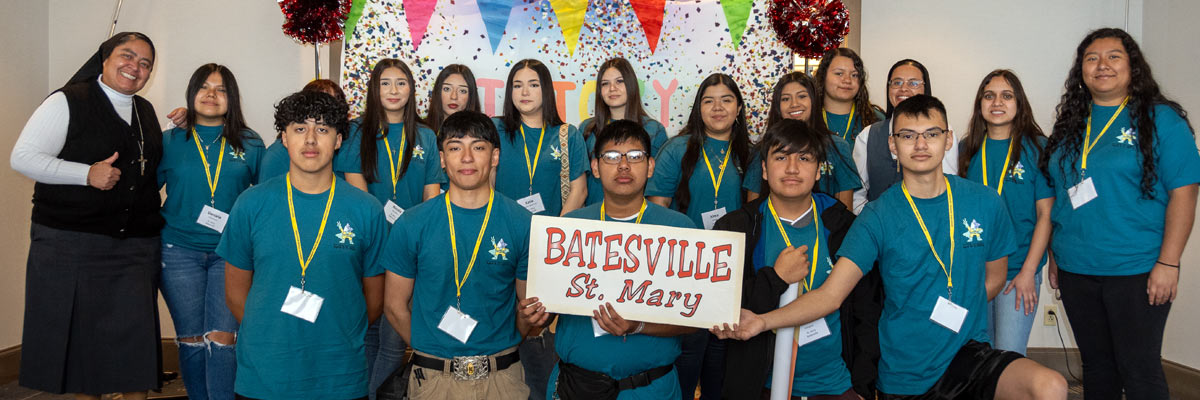Official Website of the
Catholic Diocese of Little Rock
Reception of a Relic of Blessed Stanley Rother
Published: January 14, 2018
Bishop Anthony B. Taylor preached the following homily at the Cathedral of St. Andrew in Little Rock on Sunday, Jan. 14, 2018. It was based on the readings for the Second Sunday of Ordinary Time, Year B.

Bishop Taylor
In today’s Mass, in which we receive formally in our Cathedral a first-class relic of Blessed Stanley Rother, a piece of one of the ribs which in life had covered his heart, we recall how he had given that heart so generously to the Lord by responding to his call to the priesthood and to the people of the flock that the Lord had entrusted to his care.
In today’s Gospel we have the vocation stories of three of the Apostles, who like Blessed Stanley, gave their hearts totally to the Lord as well: two of John the Baptist's disciples leave him to follow Jesus, and then one of whom (Andrew) also brings his brother Simon to the Lord. But there are two odd things about this story.
First, John the Baptist gives witness to Jesus. So why doesn't he switch over and start following Jesus too? And bring all of his disciples with him? Not just these two? That would have given Jesus' movement a big boost right from the beginning and prevented the competition that later arose between his disciples and those of Jesus.
There is a big difference between a career and a calling. Careers are jobs we choose. The disciples had a career in the fishing industry. Callings are chosen for us by God, whom we then obey.
The question is: How much did he know and when did he know it? My guess is that John the Baptist really didn't know all that much. I know that Father Rother didn’t know what he was getting himself into when he accepted the Lord’s call to go to Guatemala. And I imagine that John didn’t fully know what he had gotten himself into either.
But he did know to open his heart to the work of the Holy Spirit and I figure that when the Holy Spirit put the words "Behold the Lamb of God" on John's lips, these disciples may have heard more in John's words than John himself did. I know from experience that people sometimes hear things differently in my homilies than I had intended. The Spirit sometimes works that way to bring to an individual hearer God's special word for them and I think that’s what happened here.
The other odd thing in today's Gospel is that we are told the name of only one of these two former disciples of John the Baptist: Andrew, the patron saint of our diocese. Yet the other unnamed disciple not only doesn't disappear from the scene, he actually reappears more frequently in John's Gospel than Andrew himself does and, most strikingly, only in John's Gospel.
This unnamed disciple is often called "the disciple whom Jesus loved." He is the one who leaned on Jesus' chest at the Last Supper, was with Peter when he denied Jesus, and stood with Mary at the foot of the cross. He outran Peter to Jesus' tomb, recognized the risen Lord on the beach and — by now this should be no surprise — turns out in fact to be the author of the Gospel of John, as we find in John 21:24: "It is this same disciple who is the witness to these things; it is he who wrote them down and his testimony, we know, is true."
So the unnamed disciple is John the Evangelist himself and what we've got here in today's Gospel is John's version of his own vocation story, which by the way, is quite different from the version we find in the other Gospels, where John, Peter, Andrew and James are mending their nets on the shore of the Sea of Galilee when Jesus calls them — as we will hear in next Sunday's Gospel.
But according to John, there was an earlier chapter to his story. He and Andrew had been followers of John the Baptist, so their change to following Jesus was more like a change of seminaries than a change of vocation — matriculating from one good spiritual teacher to an even a better one.
And then Andrew brings his brother Simon to Jesus, who renames him Peter and all three abandon their careers to follow their calling. Just like Father Rother who was active in Future Farmers of America and was expected to inherit the family farm and pursue a career in agriculture, but who left it all behind to do what Jesus asked of him. Or for that matter, like Father Chan of your parish, who left behind a lucrative career in medicine to do what the Lord asked of him.
There is a big difference between a career and a calling. Careers are jobs we choose. The disciples had a career in the fishing industry. Callings are chosen for us by God, whom we then obey. Every single one of you has a God-given vocation in the broad sense of the term, a place in his plan to which he is calling you. So, have you listened for his voice?
Are you obeying God's call in your life, living for something bigger than yourself — bringing Christ to others in the course of your daily activities? Or do you just have a career and perhaps an empty one at that, if all you are doing is pursuing your own personal goals, which are not the same thing as God’s goals. To hear our call, we first must listen, which is the fruit of prayer and does take time.
My greatest hope is that each of you will hear God's call personally and, having heard his voice, and inspired by the example of the saints who have gone before us, including Blessed Stanley Rother, that you too will then respond to him obediently, generously and courageously. That is, in a way worthy of the Lord to whom you will one day have to give account of your obedience to his call — or lack thereof!









